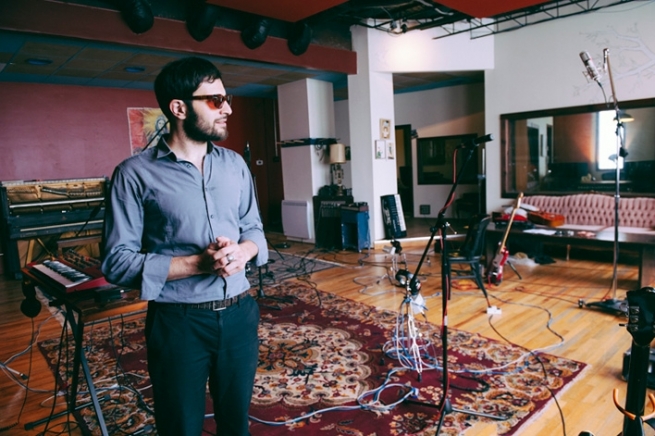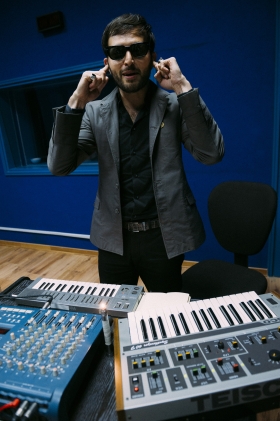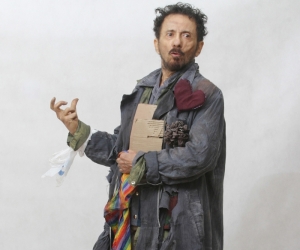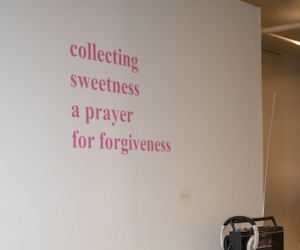
It’s Friday night in Montreal, and a who’s who of local musicians is packed into the back room of Casa del Popolo to check out the first public appearance of Master of Masters My Master. Nobody knows anything about the music they are about to hear. All they have to go on is an event page on Facebook. But this is the latest project from Radwan Ghazi Moumneh, founder of Jerusalem In My Heart and house producer at the celebrated Montreal recording studio Hotel2Tango, and in this city, news of a Moumneh performance has a currency all its own.
In their first live show, Master of Masters My Master collaborators Moumneh and Alexei Perry-Cox (of the defunct duo Handsome Furs) create a synth-heavy, industrial-strength loop cycle distinguished by the latter’s poetically inclined, clenched-teeth whispers. As Perry-Cox explains later, the performance was not a finished product but, rather, the trial-and-error of a continuous experiment. The previous week, a similar collaboration took place at the Montreal Museum of Contemporary Art, where Moumneh and local indie band Suuns reprised a spontaneous film score they had debuted at the 2013 edition of Pop Montreal.
Moumneh is what you’d call a musician’s musician—someone whose accomplishments garner an uncanny respect from those similarly involved in the craft. But to most music fans, he remains a bit of an enigma. Jerusalem In My Heart’s debut album, Mo7it al-Mo7it, emerged in 2013 after eight years of the project’s existence as the live incarnation of an evolving conceptual audiovisual experiment. Beyond that, his name pops up in a raft of transient collaborations with unlikely artists. To fans of Montreal hardcore, Moumneh was the controversial lead singer of screamo bands IRE and The Black Hand, before mysteriously leaving the scene behind at the peak of his punk popularity.
So just who is Radwan Ghazi Moumneh? By his own admission, he hasn’t followed the career trajectory typical of a professional musician, and his accomplishments may seem erratic as a consequence. But in the context of his rich life story, Moumneh’s work and values crystallize in a way rarely evidenced on the surface of his music.
Outsider Roots
The matter of where you are and where you want to be is significant to understanding how Radwan Moumneh operates. “A lot of people leave home not because they want to, but because they have to,” Moumneh says, early in our conversation at Hotel2Tango Studios, where he spends most of his days producing and engineering albums for others. He co-owns the studio, but as he readily admits, the building’s ten-year mortgage will be paid down eighteen months from now. “After that, I’m ready to move on.”
If Moumneh, who is nearing forty, is forever restless, it may be because he’s been on the move from the very beginning. Born in 1975 at the outset of Lebanon’s civil war, he has lived in exile for his entire life. “We moved immediately after I was born. We went to the first country that gave my father a visa, which was the Sultanate of Oman in the [Persian] Gulf [area]. We stayed there sixteen years.” A foreigner in a country that hadn’t yet figured out how to handle the influx of Arabs flooding in from other conflict-ravaged regions of the Middle East, Moumneh was, at first, only allowed to attend the Hindi schools available to Oman’s traditional servant class. “I felt like I was in this tornado of mixed cultures,” he recalls. “From Grades One to Three we were forced to go to an Indian school. We learned to speak Hindi in an Arab country. It was a very confusing period.”
The decision to relocate to Canada was made in 1993, after all other options had fallen away. After sixteen years in Oman, Moumneh’s father had come to accept that the Sultanate would never grant his family the citizenship they needed to start a business. Meanwhile, Lebanon’s civil war had ended only two years earlier and the situation on the ground was still very fragile. Moumneh’s father accepted an offer to settle in Laval, a suburb of Montreal, but like many other Arab immigrants of their generation, Moumneh’s parents had trouble bridging the vast divisions between the Lebanese and Canadian ways of life. “For my father, it didn’t last very long—three, four years. He didn’t like it. He decided to go between Beirut and Montreal. By the six-year mark, he decided it was safe enough to move back.” But for Radwan, Montreal had opened a door onto a creative world filled with possibilities. “I was in my early to mid-twenties. I’d started playing music. I wanted to go to audio-engineering school, and I was playing in a punk hardcore band with my friends. I wanted to tour. I had all these ambitions about being in music. I didn’t want to go back to work with my father, which would have been the case.” When his entire family moved back to Lebanon, Moumneh decided to stay and see where music took him.
Hardcore Will Never Die
“I bought those cassettes in 1994–95, and I can still listen to them,” Moumneh remembers fondly of hardcore punk bands The Misfits and Suicidal Tendencies, which captured his imagination and led him to forge his own path. “From that point on, I listened to punk music and I had punk ethics. That is so closely tied with what I do now, thematically, even though there’s been an evolution.”
The Montreal hardcore scene of the ’90s was primed for new voices and new directions. Moumneh’s first real band, IRE, featured Jeff Feinberg, guitarist for Boston hardcore act Converge, who had recently relocated to Montreal and formed the crust-punk–hardcore band with former Foreground guitarist Patrick Fontaine and drummer Eric Fillion (best known, these days, for founding and curating the invaluable Tenzier label, which releases archival recordings from long-forgotten Québécois avant-garde artists).
In IRE, Moumneh first began to explore his relationship to a past directed by larger geopolitical forces. By taking up the microphone in that context, he embraced a creative outlet that called upon him to speak his mind for the first time. “In that style, you had to have something to say. There was already this whole political aspect to it, so for me it became very important to write an Arabic song, to have these be sort of milestones in punk culture—Arabic songs talking about the Palestinian–Zionist problem.” Though initially reluctant, the rest of IRE agreed to Moumneh’s idea, and released a well-received seven-inch recording of the song “Atfal al-Hejara,” which led to the band’s 1996 debut album, Adversity Into Triumph, and an eponymous EP on Michigan’s short-lived Schema Records in 1997. The band released two albums before Feinberg returned to the United States. From the ashes of IRE rose The Black Hand, whose combination of crust-laden hardcore and Israeli–Palestinian politics continued to attract attention with album titles such as War Monger (2002) and song titles such as “Shit Treaty of Zion.” The band’s position on the Israeli occupation of the Palestinian territories meant that controversy followed the band wherever it travelled. “We walked right into what you would expect from these things,” Moumneh says of those years. “When you’re young, you’re insensitive to a lot of things. It started with one seven-inch, but it remained as my statement.”
Moumneh’s discovery of his political voice soon collided with a world that was dramatically changing in the early 2000s. “9/11 and the Second Intifada raised the volume of the discourse. There was a lot of debate around it in the States, and especially in Europe. One of our shows was shut down by German activists. Twenty-five anti-fascist kids stormed the stage and wouldn’t let us play because they wanted to fight us. To them we were fascists, neo-Nazis, because we were equating Zionism with terrorism.” The toll of the message was beginning to wear on his bandmates as well. “They were supportive—but in the long run, they weren’t ready to take on my cause as their own, night in and night out, ” Moumneh admits.
By its 2004 European tour, the band had decided to break up. “I left Montreal for that tour with all my stuff packed, and instead of coming back to Canada I went on straight to Beirut. I was done with being here. I wanted to be with my family. I felt this total disconnect with Canadian living.”
Jerusalem In His Heart
Whether Moumneh had valorized his Lebanese roots to the point of alienation as a reaction to life alone in Canada after his family left is a murky question to ponder. What is more apparent is that this act of compensation was part of a larger identity crisis universal to emigrants. But when he returned to Beirut to resume the life that had been interrupted by the civil war so many years before, the illusive ideal he’d been building collided with reality. “I brought my computer, my soundcard, my amp—everything I wouldn’t be able to get there. I shipped everything else I owned. I became a citizen of Beirut. And when I got there, I worked in my father’s gas station. We’d have every second Sunday off, and work from 7 a.m. to 7 p.m. I did that for a little under a year. It was not the Lebanese life I’d envisioned.” When Moumneh returned to Montreal a year later, ostensibly to visit friends, a quick trip turned into a jarring contrast in life choices. “All of a sudden I realized the luxury we have (in Canada), and I just felt lucky to not have to work seventy-five hours a week to barely pay rent.” Back in Montreal, surrounded by people who valued his creative abilities, Moumneh found the revelation he’d been seeking in Lebanon.
It helped that old connections in the Montreal music community were eager to give him a platform for new ideas. At the time, Gary Worsley, cofounder of Alien8 Recordings and a fan of The Black Hand, was curating a bill for an upcoming show at Casa del Popolo. When Moumneh expressed interest in presenting a new project, Worsley offered him a stage. “I was aware Radwan was moving in a new direction, and this was a great opportunity to see and hear the project live,” Worsley recalled. “I was intrigued to see what had become of Radwan since our musical past lives.”
The show proved to be a 180-degree turn from the hardcore on which Moumneh had built his reputation. He named his new project Jerusalem In My Heart (JIMH), after an album of the same name by the famous Lebanese classical singer Fairouz. The name spoke at once to his connections to Lebanon and doubled as a statement on the Israeli–Palestinian conflict, which had been so central to his creative practice from the beginning. “I was going to try this weird guitar playing in an Arabic style. I’d noodled in that style before, but since I’d always been a singer, my main focus had been lyrics. There was no vocal component in JIMH at that point. I wanted the visual aspect to be the words. I had this collection of images of the infamous massacre at Sabra and Shatila, very gory images, bodies torn to pieces, and so that was projected while I was playing this guitar.”
Though the thread of his political message had remained relatively intact, Moumneh’s shift from punk-rock chaos to conceptual installation art couldn’t have created a more dramatic contrast. Worsley recalls: “I spoke with a number of older friends from the IRE days that evening. We were all surprised but happy to see Radwan successfully transcend genres.”
After years of personal exploration that led into unknown territory, Moumneh was newly invigorated by JIHM. “I just let my imagination go where it wanted to go, which involved creating these events that became quite extravagant and theatrical. JIMH became about doing live set pieces that changed with every performance and never held back.” It wasn’t uncommon to see upwards of forty people onstage at a JIMH show.
Since its inception in 2005, JIMH has steadily evolved into an amalgamation of traditional Arabic signatures with Western electronics and experimentation. The project also advanced at an incongruous pace, and the installations remained largely ephemeral; very few of Moumneh’s central ambitions from 2005 to 2012 were ever recorded. “At the time, I had no commitments to anybody,” Moumneh explains. “I didn’t have a record, label, manager, or booking agent. So I just did things when I felt it was time to do them— which was about once every ten months.”
The Anti-Careerist’s Career
JIMH’s creative output has been fashioned in opposition to what most other artists would consider a professional career, mostly because Moumneh himself is a busy and successful music-industry professional. In 2007, after manning the mixing boards at the Montreal venue Sala Rossa for two years, he partnered with Constellation Records, Harris Newman, Howard Bilerman, Thierry Amar, and Efrim Menuck (the latter two of Godspeed You! Black Emperor and Thee Silver Mt. Zion fame) to purchase a building in the Mile End district that is now one of Montreal’s most storied musical hubs. The building is home to Constellation and to Newman’s highly regarded Grey Market Mastering studio, as well as Hotel2Tango, a recording studio jointly owned and operated by Moumneh, Bilerman, Amar, and Menuck. In its eight-year existence, Hotel2Tango has grown into what is arguably Canada’s most sought-after studio—Arcade Fire, King Khan & BBQ, Timber Timbre, and Tony Conrad leading a long list of Constellation-affiliated and Montreal-based musicians who have worked there.
“My approach to JIMH is the 180-degree opposite of the production work I do at Hotel2Tango,” Moumneh admits. “We record a lot of pop stuff here—I’m good at it, but I don’t go home and listen to rock records.”
It’s not a stretch to say that Moumneh’s post-hardcore musical evolution follows a path similar to forebears such as Brian Eno, Todd Rundgren, or Connie Plank: the producer-musician deeply adept at shaping and communicating the more commercial ideas of others, but attracted to the extremities of experimentation and the spontaneities of collaboration when left to his own devices. And so, it seems fitting that here at Hotel2Tango—where he feels so physically comfortable yet aesthetically removed—our conversation finally turns to JIMH’s debut album, Mo7it Al-Mo7it, long-awaited before at last being released in 2013, after much prodding from friends and from Constellation Records. It’s a subject Moumneh treats with great complexity and trepidation: “I didn’t think the concept was strong enough to [be] put out [on] a record—contribute to music history—and not have it be bullshit. The harsh reality is that I work in the music business and not everybody’s art is good. Stuff leaves here and it’s well done, but are you really adding anything to the history of the art? You’re just making a record, which is fine; and the flipside is that people are making masterpieces that nobody will ever hear about, which is heartbreaking.”
Professional musicianship, I propose to him, involves a certain amount of duress, things that must be done to get ahead. It seems to me that Moumneh, through his producer’s chair, had managed to find a side door into a freedom that most of his peers don’t get to experience. It’s a notion he’s not entirely comfortable with. “There’s also the perspective that you’re not taking any risks by doing it this way,” he counters. “You’re only playing the safe moves. It’s easy to be uncompromising when you don’t have anything to lose.”
Mo7it Al-Mo7it came about because Moumneh had more to gain than to lose. “I wanted to present JIMH outside of Montreal, and talked to Don and Ian [at Constellation] about helping me with that, and they said it would be hard to sell it with no record. Sure enough, everyone we spoke to in Europe said the same thing. So I finally came to the conclusion that the time had come to commit to a record, so I could turn JIMH into a touring project.” Moumneh had already been working with the Chilean filmmaker Malena Szlam Salazar for several years, and had wanted to collaborate with the French electronic producer Jérémie Regnier for some time. The trio joined the Constellation fifteenth anniversary tour in Leipzig, Germany, and from there continued on a small tour together.
With all the discipline of a veteran producer, the process of recording was key to making the right statement. “I had to do it in a very specific way for it to feel right. I’d get up at four or five in the morning and record it in my kitchen. It’s all done on my laptop, and two of the pieces—the improvised acoustic pieces—were recorded at friends’ houses. Those weren’t recorded for the album; they were recorded for rehearsals; and the performance was strong enough that I wanted to include that vibe. I recorded them on my phone and edited it from there. Those recordings had a passion that would’ve been impossible to capture using a $15,000 microphone to record a $20,000 harp. The spirit of the session, to me, outweighs the technical.”
Mo7it al-Mo7it is about as anti-studio as Moumneh could go; Hotel2Tango was at his disposal, but its proximity to his work life felt too close. “It was an aesthetic decision. This is a very expensive luxury to record at this studio, so when people come here, because of the pressure of how much it costs, everyone ends up being so precious about everything. And I can count on three fingers the number of artists who’ve passed through here who understand that preciousness is pointless. So I wanted to get away from that. I wanted to go on instinct.”

Setting the Record Straight
And so we arrive at the present moment, which—given Radwan Moumneh’s resolutely instinctive approach—is hard to define. The mortgage on Hotel2Tango is almost paid off. He is constantly scheming for a way to move his life back to Lebanon. The trick, he tells me, is to find a way to do it without sacrificing in the process all he has gained in freedom and creativity. When I ask about his most engrossing project these days, he tells me he wants to produce a film adaptation of an obscure book by a dead Lebanese writer.
All of which is to say, Moumneh’s plans for the future sound, unsurprisingly, drastically different from the successes he’s accumulated thus far. He’s restless, nearing forty, and looking, once again, to reinvent himself.
If he were to leave Canada to begin a new chapter of his creative life elsewhere, there would be at least one clear repercussion: Montreal and its many musicians would be affected most of all. As Alexei Perry-Cox says, “Radwan makes this a far more interesting and more feasible place to play music,” a sentiment also reflected by Gary Worsley. “Radwan has been a key member of whatever musical scene he has been a part of since I first met him,” he says. “Throughout those years, he has amassed many allies in the community, from so many different areas, be it producing recordings, doing sound at live gigs, or his countless collaborations with other people on recordings and in live endeavours.”
With nearly two decades as a musician under his belt, Moumneh has gotten pretty far on instincts. If there were any fears that releasing a JIMH album would temper the transience of his approach to date, a list of his upcoming commitments quickly dispels them. Beyond his collaborations with Suuns and Master of Masters My Master, JIMH is rehearsing with a new lineup for dates across Canada in the Spring and early Summer of 2014, followed by dates in Europe and the Middle East.
Increasingly, Moumneh’s natural role as an ambassador between Western festivals and the burgeoning Lebanese experimental music community has come to the fore, as festival directors from Montreal, France, and beyond invite him to curate events featuring the best of his homeland’s emerging community. And Irtijal—a free-jazz infused collective of Beiruti musicians who run an annual festival for experimentation—have asked Moumneh to curate a showcase of international performers.
Whether or not he makes good on his claims to move back to Lebanon for good, we shall have to see. We all have places that inspire us and places where we do our best work, and those places aren’t always one and the same. In the end, this is the central dilemma that has guided Moumneh’s career from the beginning. After two decades of creative deliberation, he may not have found a fitting resolution to this central problem in his life, but he has figured out how to use the dynamic of identity to his greatest advantage.
Audio: Amanem. Composed and performed by Jerusalem In My Heart. Photos: (Top) Radwan Moumneh at Hotel2Tango recording studio in Montreal. (Middle) Moumneh plays saz at The Basement in Beirut, Lebanon. (Bottom) Moumneh during broadcast of “Ruptured” radio show in Beirut. All photos by: Tanya Traboulsi.


